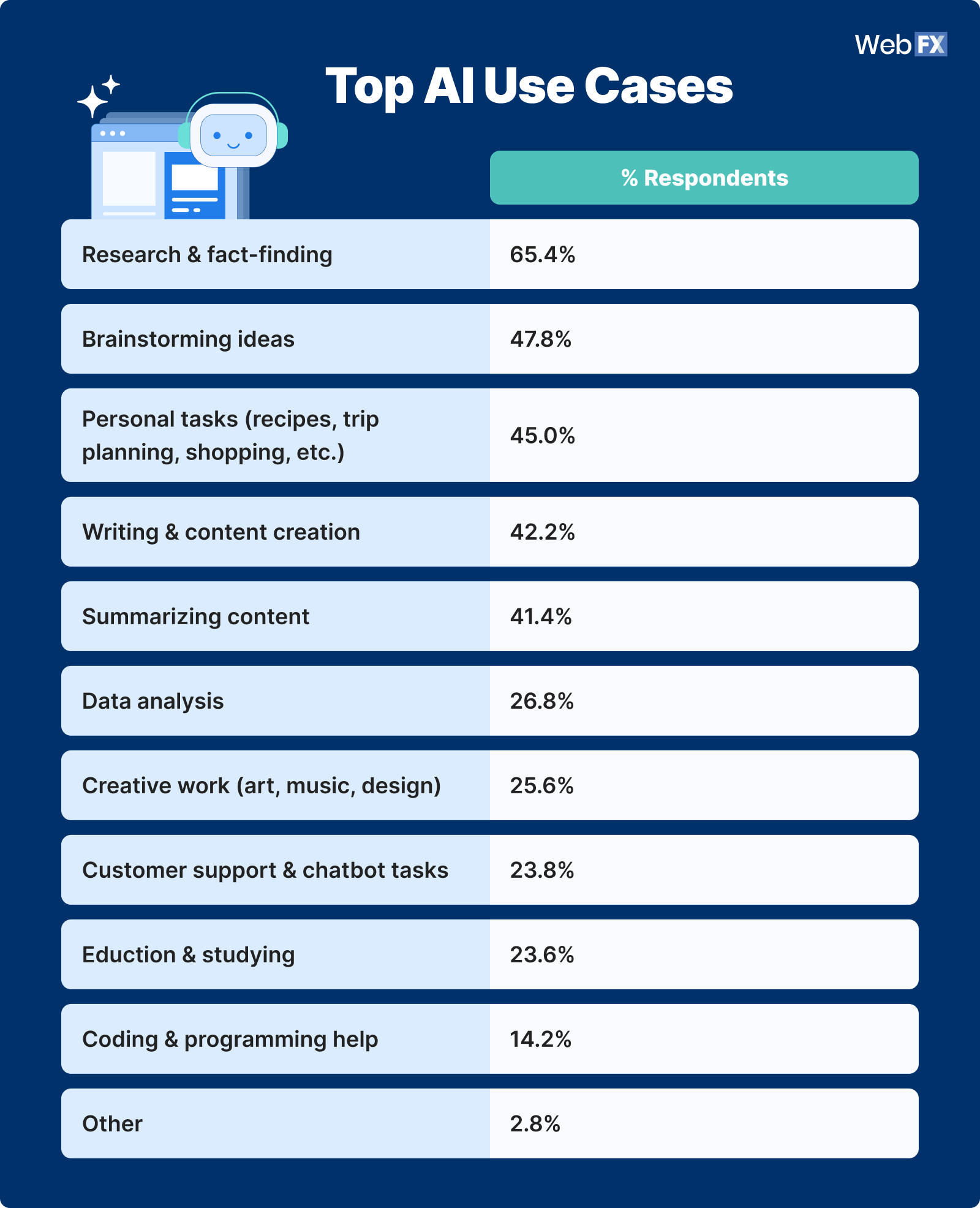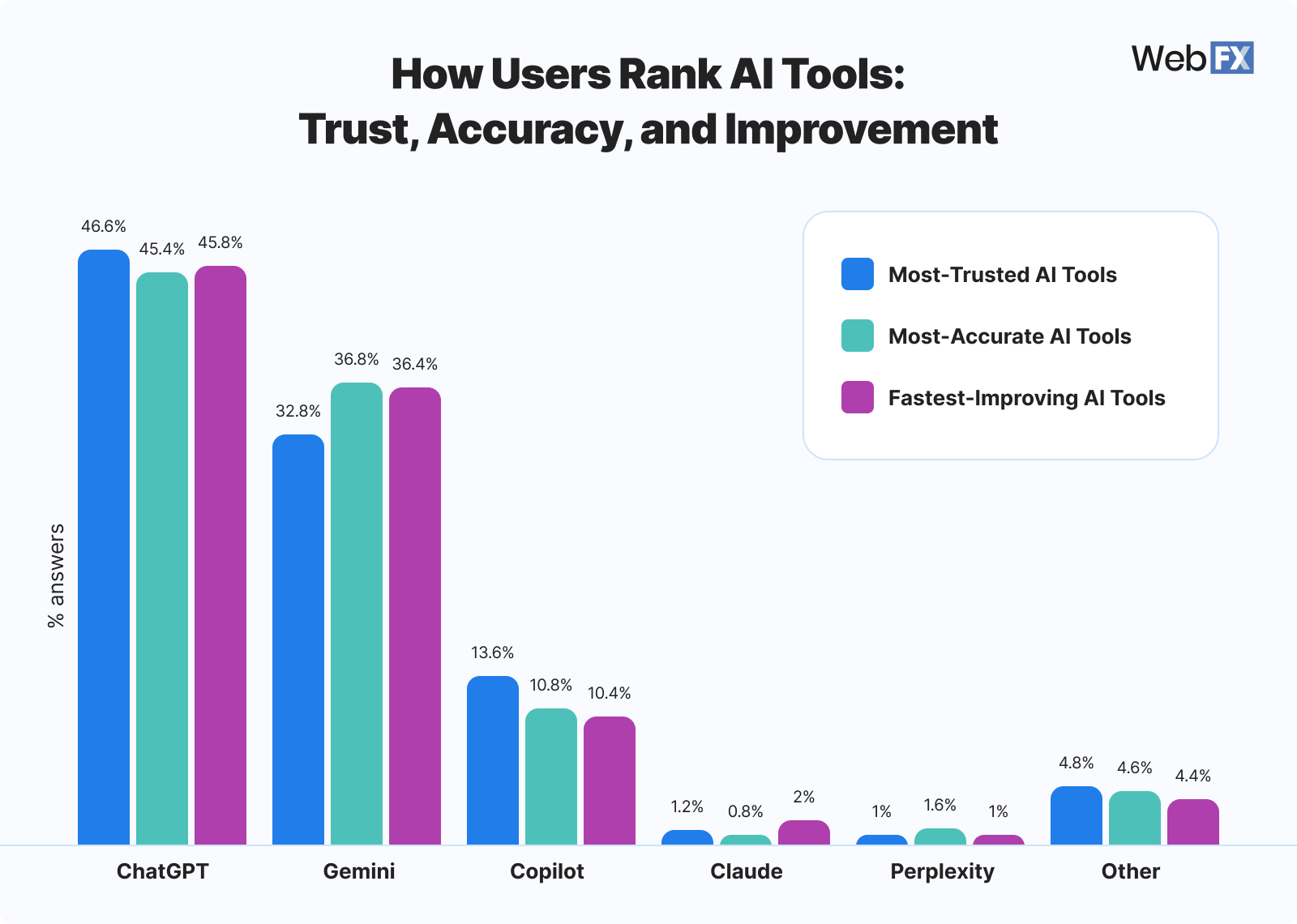100% know it, 80% like it, and 25% pay for it. AI has shifted from emerging technology to an essential part of the digital stack.
Tools like ChatGPT, Gemini, and Copilot have become staples in modern search and everyday workflows — right alongside Google search, email, and productivity apps.
To see how this shift is playing out, we surveyed 500 people on which AI tools they know, which ones they actually use, and how they feel about them.
The results reveal a shift from early experimentation to broader adoption and clearer expectations for performance. Here’s an overview of the key patterns and behaviors shaping today’s AI landscape.
Key Findings: How People Are Using AI
- AI Enters Daily Tech Stack: 1 in 3 people use AI multiple times per day, along tools like email and traditional search engines.
- AI’s Power Pair: ChatGPT and Gemini command 85% of usage, with other tools competing for niche loyalty.
- Research Leads AI Use Cases: The top AI use case is research & fact-finding (65%), signaling direct competition with Google Search.
- Adoption Outpaces Trust: Fewer than half of AI users rate it highly trustworthy.
- Users Pay to Remove Friction: 25% have upgraded to premium, driven by speed, features, and better models.
AI usage shifts from novelty to necessity
Over half of respondents engage with AI weekly (at minimum).
The frequency of use shows just how deeply AI has become embedded in daily life:
- 37% of respondents use AI multiple times per day.
- 30% turn to AI a few times per week.
- 12% use it once per day.
With nearly 4 in 10 people using AI multiple times a day, these tools have become part of users’ daily tech stacks.
Takeaway: As AI becomes more ingrained in daily habits, it’s no longer a question of if your audience is using AI, but how. Brands that win don’t just optimize for traditional Google search, but for AI discovery ecosystems that fuel discovery and decision-making.
Today’s go-to AI tools for users
While usage frequency shows AI’s stickiness, the real competition comes down to which tools earn the most loyalty. On the surface, there’s a crowded field of options, but usage favors a few leaders.
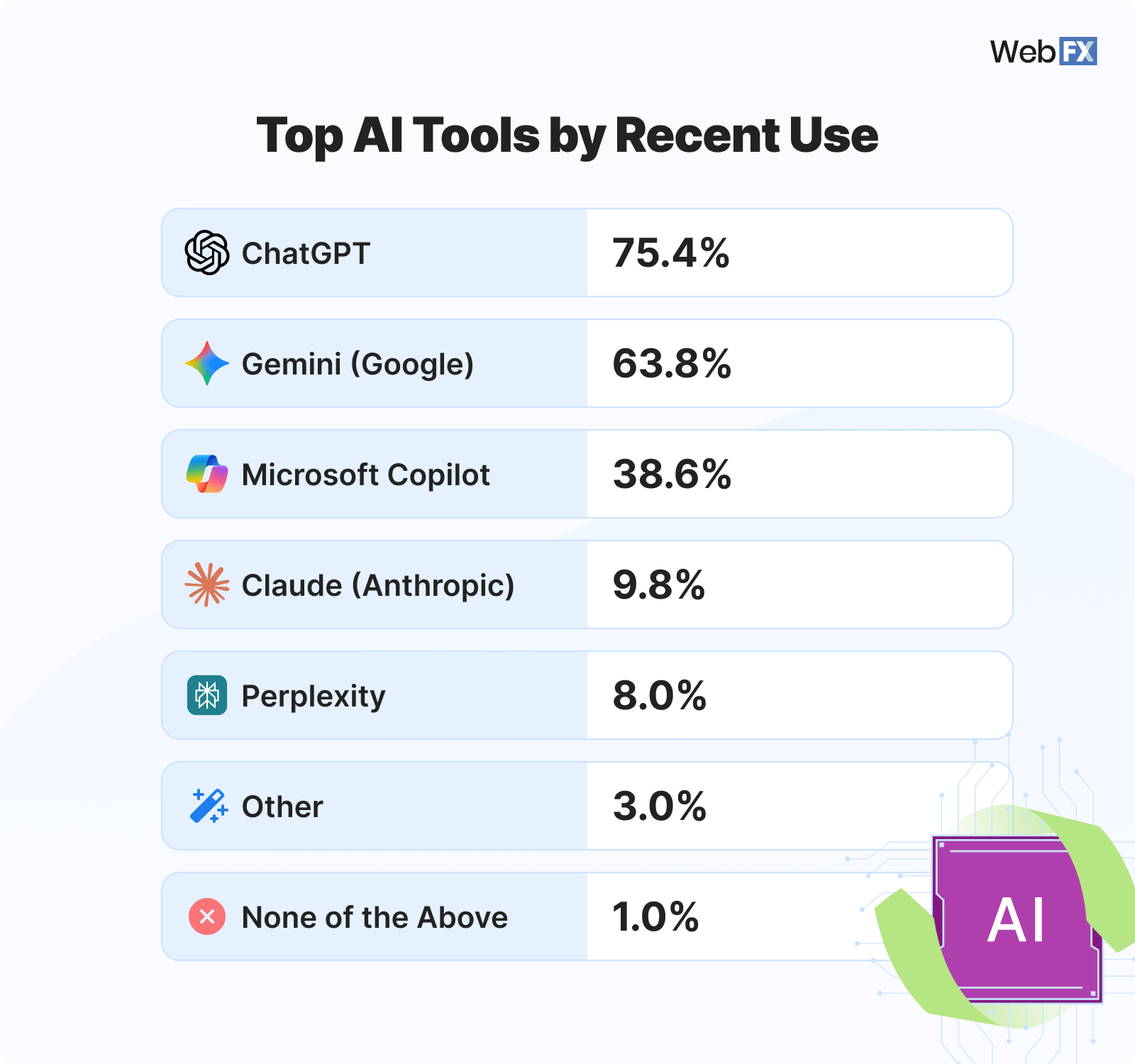
📊 Source Data
| Most-Used AI Tools | % Answers |
| ChatGPT | 75.4% |
| Gemini (Google) | 63.8% |
| Microsoft Copilot | 38.6% |
| Claude (Anthropic) | 9.8% |
| Perplexity | 8.0% |
| Other | 3.0% |
| None of the Above | 1.0% |
When asked to name a primary tool, loyalties sharpened:
- 53% chose ChatGPT.
- 32% chose Gemini.
- 12% chose Copilot.
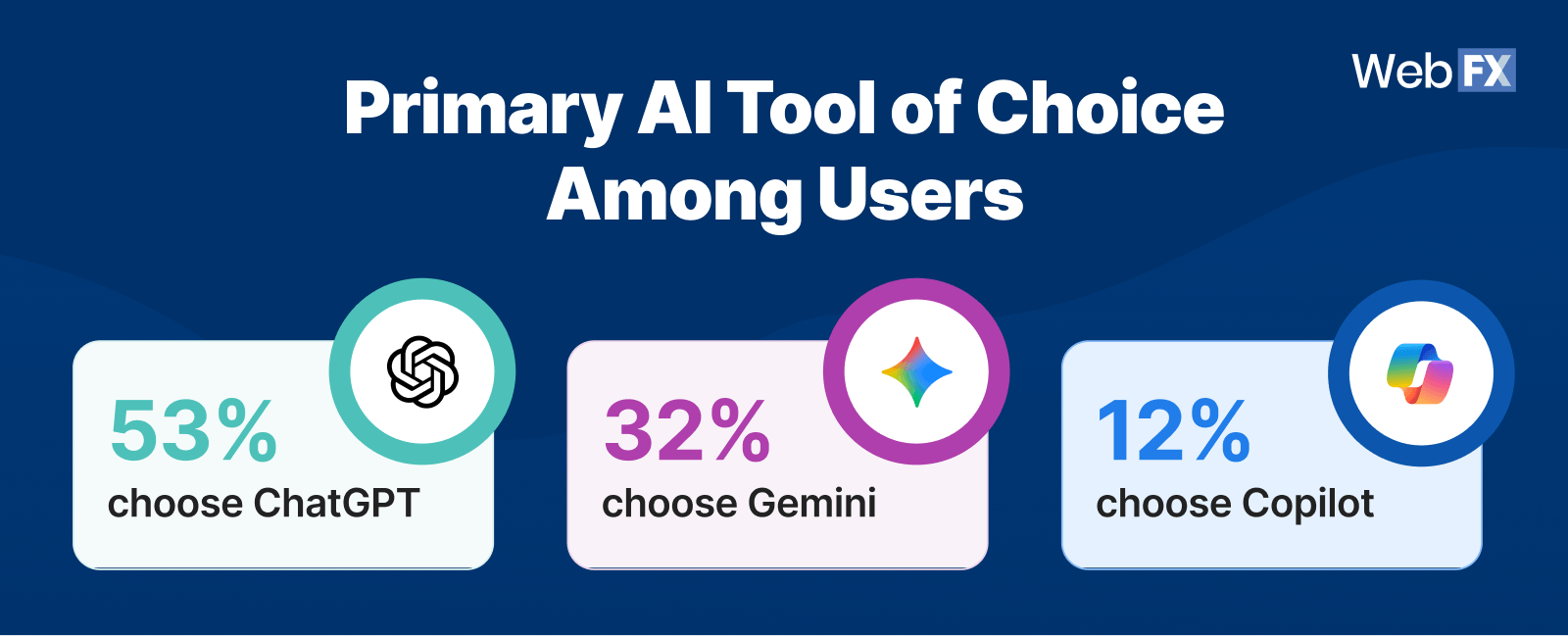
The pattern echoes other tech adoption waves, where a long list of players eventually narrows into a few dominant brands.
Takeaway: As AI adoption grows, loyalties are focusing in on a few leaders. ChatGPT and Gemini dominate everyday use, while tools like Copilot, Perplexity, and Claude have more niche followings for tasks like complex reasoning or enterprise integrations.
Research dominates AI use cases
When it comes to what people actually do with AI — research and fact-finding emerged as clear winners. Users lean on AI to search, sort, and make sense of information.
Other top uses include: Brainstorming ideas, personal tasks (like recipe searches and trip planning), and writing/content creation.
📊 Source Data
| AI Use Case | % Respondents |
| Research & fact-finding | 65.4% |
| Brainstorming ideas | 47.8% |
| Personal tasks (recipes, trip planning, shopping, etc.) | 45.0% |
| Writing & content creation | 42.2% |
| Summarizing content | 41.4% |
| Data analysis | 26.8% |
| Creative work (art, music, design) | 25.6% |
| Customer support & chatbot tasks | 23.8% |
| Eduction & studying | 23.6% |
| Coding & programming help | 14.2% |
| Other | 2.8% |
Takeaway: AI is being used first and foremost as an information engine, competing directly with Google Search for discovery moments. For SEO, this means ranking on page one isn’t enough. Brands need to structure content so it’s the source AI tools cite, summarize, and recommend when users look for answers.
Trust and accuracy: AI tools leading the pack
For most users, AI no longer feels like uncharted territory. Nearly 7 in 10 (69%) say they are confident or very confident using AI tools, and 80% report they’re satisfied with their primary platform.
But beneath that comfort lies a trust gap. When rating qualities like accuracy and trustworthiness, many respondents landed in the middle. AI unlocks new levels of productivity, but users don’t always trust outputs enough to fully rely on them.
Across measures of trust, accuracy, and fastest-improving tools, two clear leaders emerge: ChatGPT and Gemini.
- Most Trusted: ChatGPT (47%), Gemini (33%), Copilot (14%)
- Most Accurate: ChatGPT (45%), Gemini (37%), Copilot (11%)
- Fastest Improving: ChatGPT (46%), Gemini (36%), Copilot (10%)
📊 Source Data
Most-Trusted AI Tools
% Answers
ChatGPT
46.6%
Gemini
32.8%
Microsoft Copilot
13.6%
Claude
1.2%
Other
4.8%
Perplexity
1.0%
Most-Accurate AI Tools
% Answers
ChatGPT
45.4%
Gemini
36.8%
Microsoft Copilot
10.8%
Other
4.60%
Perplexity
1.6%
Claude
0.8%
Fastest-Improving AI Tools
% Answers
ChatGPT
45.8%
Gemini
36.4%
Microsoft Copilot
10.4%
Other
4.4%
Claude
2.0%
Perplexity
1.0%
Takeaway: AI adoption is outpacing trust. People use AI daily because it’s fast and helpful, but fewer than half find it highly trustworthy. This convenience-over-confidence dynamic leaves room for platforms to win loyalty by closing the credibility gap — and for brands to stand out as reliable sources when users look for answers they can believe.
AI Trends in Monetization: Why Users Pay
While most users stick to free plans, 25% have upgraded to a premium AI tool in the past year.
The market leaders in monetization mirror the leaders in usage, with ChatGPT Plus and Gemini Pro topping the list, followed by Copilot Premium.
Why do people pay? Paid users value performance over novelty, wanting faster, more capable tools that fit into their daily workflows.
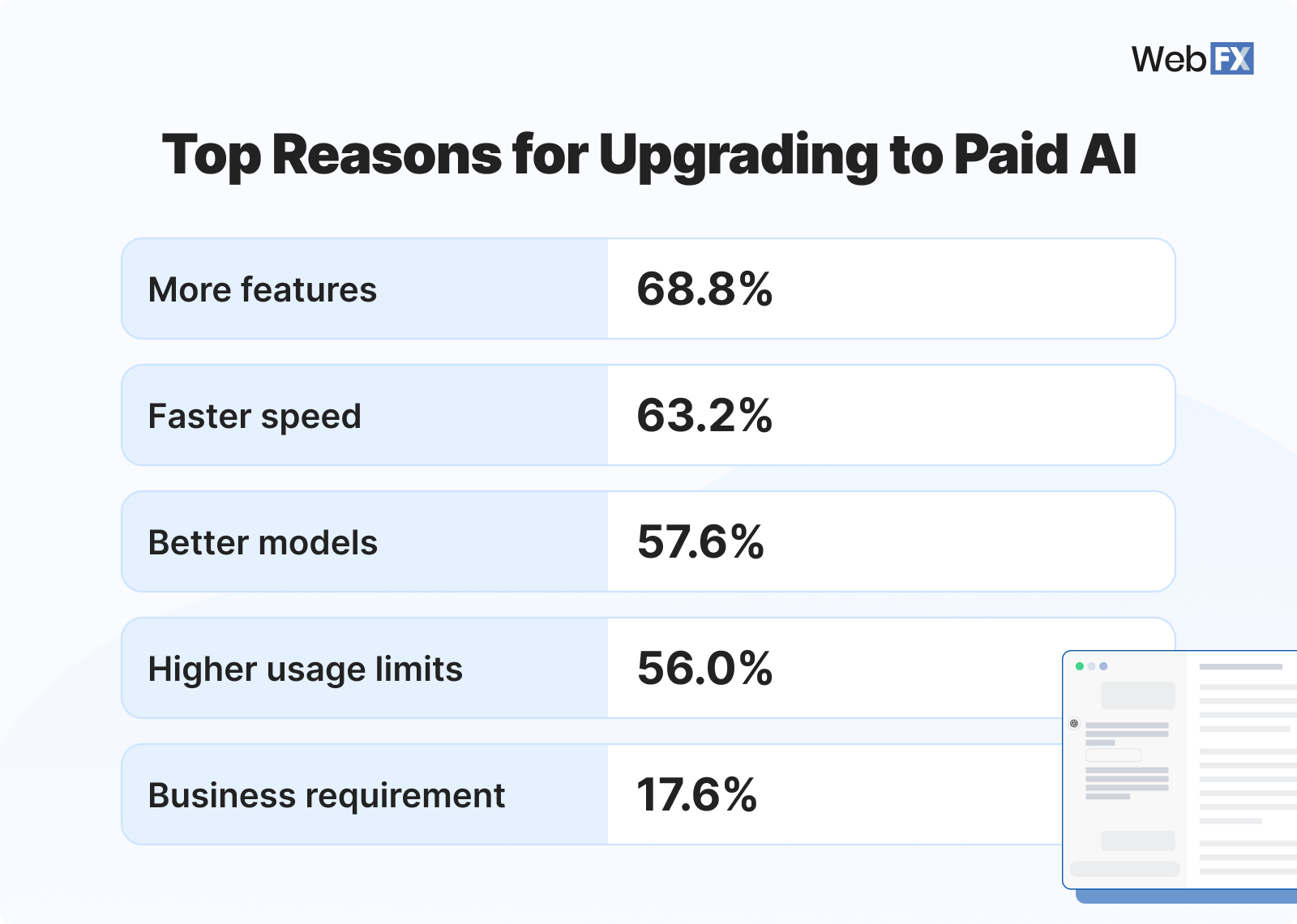
📊 Source Data
| Reason for Upgrade | % Respondents |
| More features | 68.8% |
| Faster speed | 63.2% |
| Better models | 57.6% |
| Higher usage limits | 56.0% |
| Business requirement | 17.6% |
Takeaway: Paid adoption is gaining traction, with 1 in 4 users upgrading to remove friction in their daily workflows. People aren’t paying for novelty — they’re paying for speed, features, and reliability. This shift signals that AI is moving from curiosity to utility, with performance becoming the real driver of loyalty.
5 big-picture trends from 500 AI users
Beyond the stats, the research highlights five big-picture trends shaping AI adoption and trust in 2026.
- AI is reshaping information discovery: AI’s role as a research companion signals a shift in the information discovery process, putting AI tools in direct competition with search engines.
- Brand loyalty is strengthening: Users are starting to settle on “go-to” tools with ChatGPT and Gemini leading the charge.
- Trust gap remains, despite adoption: User confidence and satisfaction outrank trustworthiness and accuracy, reflecting a market where people use AI but still second-guess outputs.
- AI usage is shifting from exploration to performance expectations: The conversation is evolving from “what can AI do” to “how well can it do it,” where paid upgrades hinge on faster, more accurate outputs.
- SEO’s new era isn’t measured in clicks: With AI replacing or reducing clicks — success now depends on structuring content so AI tools cite, summarize, and recommend your brand when users seek answers.
FAQs
How often do people use AI tools?
Over half of respondents use AI weekly at minimum. 37% use AI multiple times per day, 30% a few times per week, and 12% once per day.
Which AI tools are most popular among users?
ChatGPT and Gemini are the top tools. 75.4% of users reported using ChatGPT, 63.8% use Gemini, and 38.6% use Microsoft Copilot. When asked for their primary tool, 53% chose ChatGPT, 32% Gemini, and 12% Copilot.
What are the top use cases for AI?
The top use case is research and fact-finding (65%). Other major uses include brainstorming (48%), personal tasks like recipes or trip planning (45%), and writing or content creation (42%).
Which AI tools are considered the most trusted and accurate?
ChatGPT leads in both trust and accuracy, with Gemini ranking second and Microsoft Copilot third. For example, 47% rated ChatGPT as most trusted, compared to 33% for Gemini and 14% for Copilot.
Why do people upgrade to paid AI plans?
25% of users have upgraded to premium plans. The main reasons are more features (69%), faster speed (63%), better models (58%), and higher usage limits (56%).
What are the big-picture AI trends from this research?
The study highlights five major trends: AI is reshaping information discovery, usage is outpacing trust, daily adoption is rising, ChatGPT and Gemini are leading the market, and performance drives premium adoption.
Beyond adoption: Competing for AI visibility
AI tools are now part of daily workflows, alongside tasks like emailing and searching Google.
For businesses and marketers — the game is shifting from being visible online to being surfaced in AI results when people research, brainstorm, and make decisions.
At WebFX, we help brands adapt to this new search-and-AI-driven world — from optimizing content to earn citations in AI Overviews to running campaigns that connect your business with ready-to-buy customers.
Want to see how your business can stay visible in the age of AI? Request your custom AI marketing strategy!
This research is based on an online survey of 500 U.S. respondents, ages 18–64. The sample included a balanced mix of genders, roles (analysts, managers, consultants, administrative staff), and industries such as technology, finance, healthcare, education, manufacturing, government, and professional services. Companies ranged from small businesses to enterprises with 5,000+ employees.🔽 Methodology
-
 Emily Carter is the Sr. Content Team Lead at WebFX, where she leads the creative team behind the company’s website, blog, and email campaigns. With an M.S. in Digital Marketing and 10+ years of experience, she’s written and reviewed hundreds of articles on marketing, SEO, and tech, helping businesses turn complex topics into actionable strategies. Her work appears across WebFX and its brands, including SEO.com, Nutshell, and TeamAI, and has been featured by Social Media Today, HuffPost, and more. Outside the office, she’s usually road-tripping, hiking, or planning her next national park adventure.@emcarter16
Emily Carter is the Sr. Content Team Lead at WebFX, where she leads the creative team behind the company’s website, blog, and email campaigns. With an M.S. in Digital Marketing and 10+ years of experience, she’s written and reviewed hundreds of articles on marketing, SEO, and tech, helping businesses turn complex topics into actionable strategies. Her work appears across WebFX and its brands, including SEO.com, Nutshell, and TeamAI, and has been featured by Social Media Today, HuffPost, and more. Outside the office, she’s usually road-tripping, hiking, or planning her next national park adventure.@emcarter16 -

WebFX is a full-service marketing agency with 1,100+ client reviews and a 4.9-star rating on Clutch! Find out how our expert team and revenue-accelerating tech can drive results for you! Learn more
Try our free Marketing Calculator
Craft a tailored online marketing strategy! Utilize our free Internet marketing calculator for a custom plan based on your location, reach, timeframe, and budget.
Plan Your Marketing Budget

See AI Marketing in Action
Explore how WebFX helped a regional brand get discovered in AI search experiences — proving what’s possible with today’s AI-driven marketing!

Proven Marketing Strategies
Try our free Marketing Calculator
Craft a tailored online marketing strategy! Utilize our free Internet marketing calculator for a custom plan based on your location, reach, timeframe, and budget.
Plan Your Marketing Budget
 Sr. Content Team Lead
Sr. Content Team Lead
What to read next






